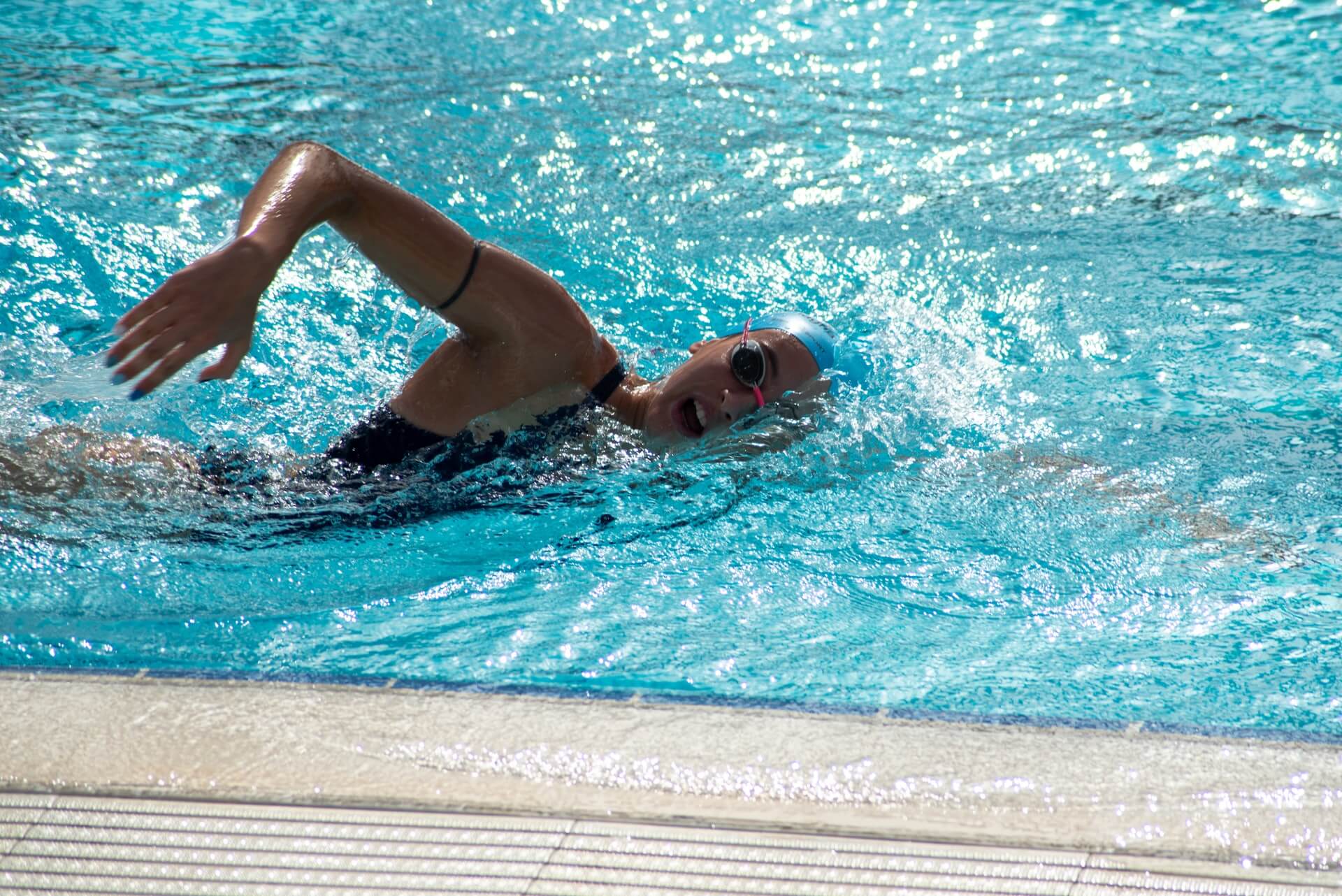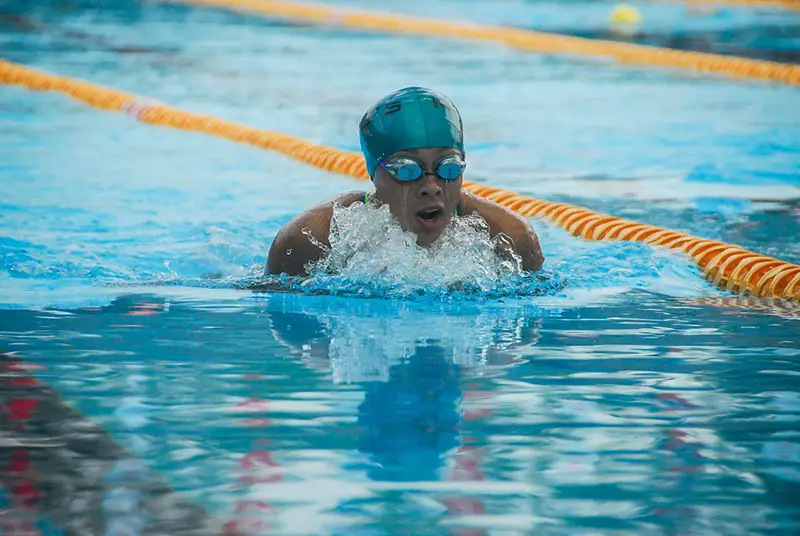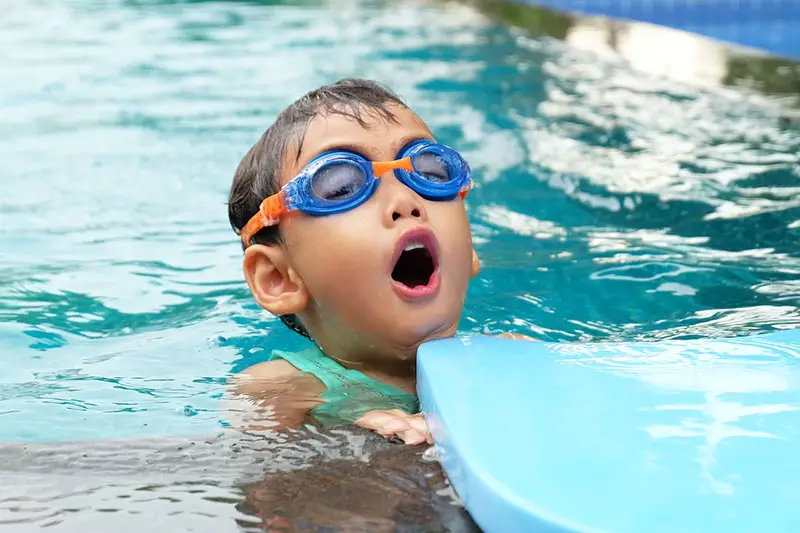Swimming is an amazing full-body workout, but it can also leave you feeling drained and tired. Furthermore, swimming seems to make people feel even more tired compared to other forms of exercise. Why is that?

There are numerous factors that contribute to the tiredness you experience after swimming. Common factors include the temperature of the water, the level of intensity during your workout, and even dehydration. Outside of swimming, factors like poor nutrition, sleep deprivation, and even psychological factors can negatively affect your energy levels in the water.
In this article, we’ll explore some of the reasons behind this fatigue and provide you with helpful tips on how to avoid feeling sleepy after swimming.
The Power of Resistance: Water vs. Air
The Physics of Water Resistance
When you dive into the pool, you immediately experience the difference in resistance between water and air. Water offers about 12 times as much resistance as air, making it a unique environment for a challenging workout.
By swimming, your body’s muscles work against the water’s resistance, pushing through it to propel you forward. This requires more effort than the same movement in air, causing you to become tired over time.
Moreover, water temperature can have an impact on your physiological systems, adding to the feeling of fatigue.
Swimming: A Full Body Workout

Swimming is a fantastic full-body workout because it targets multiple muscle groups simultaneously. When you swim, your arms and legs work in unison to create forward motion, with muscles in your core activated to maintain stability and balance.
The various strokes in swimming require different muscle activations, making it a versatile exercise routine. For instance:
- Freestyle mainly targets your arms, shoulders, and core
- Breaststroke helps you work on your legs, hip muscles, and chest
- Backstroke focuses on your back, arms, and core
Maintaining a balance between aerobic and anaerobic exercise, swimming effectively trains both cardiovascular endurance and muscle strength. As a full-body resistance workout, it will lead to swimming fatigue, which is common among most swimmers after an intense session.
Also pay attention to your swimming workout intensity and your nutritional timing (eating a pre- and post-workout meal) before and after your sessions. These factors can significantly affect your energy levels and overall performance in the water.
The Thermodynamic Challenge: How Water Temperature Affects You
The Science of Body Heat and Water
When you’re swimming, the water temperature plays a crucial role in how your body responds. Your core temperature adjusts according to your surroundings, impacting your energy levels and overall tiredness.
Swimming in an ideal water temperature of about 77 to 81 degrees Fahrenheit decreases the chances of fatigue setting in too quickly due to being too hot or cold.
However, it’s not always easy to find the perfect water temperature. Both cold and warm water can have negative effects on your body:
- Cold water: When you swim in cold water, your body works harder to stay warm, which can lead to muscle strain due to a decrease in blood flow.
- Warm water: Swimming in water that’s too warm (e.g. over 90 degrees Fahrenheit, but may be different from person to person) can cause overheating and exhaustion, especially when you’re exerting yourself with laps or a long workout. This raises your body temperature, increasing your sweat rate and quickening dehydration.
The Shiver Effect: Cold Water and Energy Expenditure
Swimming in cold water has another interesting impact on your energy levels: the shiver effect. As your body loses heat in cold water, it starts to shiver to generate more warmth. This involuntary response uses up more energy, contributing to the tiredness you feel after a cold water swim.
Moreover, swimming in cold water can increase your appetite from using so much energy, leading you to consume more calories than you would after exercising in warm water. This is likely a result of your body trying to replenish the energy it expended to keep you warm.
To minimize the negative effects of water temperature on your body, try to find a swimming environment with a temperature close to the ideal range. It’s possible your local pool is not doing a good job keeping the pool temperature at the ideal range.
If your pool is a bit on the colder side, consider wearing a swimsuit or other insulating swimming gear to keep your core temperature at a more comfortable range.
Breath Control: The Unseen Effort
The Mechanics of Breathing in Swimming

Breathing in swimming is more challenging than in other sports because water resistance and body positioning make it harder for you to inhale and exhale.
Your whole body is working together to maintain your breathing rhythm, which can contribute to fatigue during swimming. To minimize this, focus on developing proper technique and breath control while swimming. Remember to:
- Rotate your torso to help maximize air intake.
- Exhale fully underwater to prepare for the next breath.
- Avoid lifting your head too high out of the water, as this can disrupt your body position.
The Hypoxic Effect
Swimming can lead to a hypoxic effect, a state where your body experiences a temporary shortage of oxygen. This is due to the combination of holding your breath and the demands of your muscles. The hypoxic effect can be one reason why swimming makes you tired.
Here are some tips to help you manage the hypoxic effect:
- Start with shorter swimming distances and gradually increase them as you develop better breath control.
- Incorporate breath control exercises (like holding your breath and swimming underwater) into your training routine in a safe manner.
- Focus on maintaining a steady, relaxed breathing rhythm throughout your swim.
By working on your breath control and understanding the factors contributing to swimming fatigue, you’ll be able to better manage your energy levels and enjoy your time in the water.
The Psychological Component: Mental Fatigue
Concentration and Coordination: Swimming’s Mental Demands
Swimming is not just a physically demanding activity, but it also requires mental focus and coordination. As you swim, you need to concentrate on your breathing, body movements, and timing.
This mental effort can lead to mental fatigue, which is caused by prolonged exertion that can reduce cognitive performance and exercise performance.
In addition to the technical aspects, swimming can also be mentally draining due to the need for constant self-awareness and decision-making.
For example, you must calculate the optimal speed and stroke technique to navigate through the water while also planning for turns and managing other swimmers.
The Fear Factor: Anxiety and Energy Expenditure

Anxiety and stress can be contributing factors to the tiredness experienced after swimming.
If you are not used to swimming or if you have a fear of water, your body will produce stress hormones, which can lead to increased heart rate and rapid breathing.
These physiological responses can sap your energy, leaving you feeling tired even after a short swim.
Furthermore, anxiety and stress can disrupt your sleep, making it more difficult to recover from physical and mental exertion.
A good night’s sleep is crucial for tackling the demands of swimming, and poor sleep quality can heighten feelings of mental fatigue on top of the stress and anxiety you may already be facing.
To combat mental fatigue while swimming, consider these tips:
- Improve swimming skills and technique to increase confidence in the water.
- Take breaks and incorporate rest periods into your swimming routine.
- Ensure you’re getting enough sleep and managing stress effectively.
The Role of Nutrition and Hydration
Fueling the Swim: The Importance of Nutrition

When it comes to swimming, having the right balance of nutrition can greatly impact your energy levels and performance.
Eating a well-balanced meal before hitting the pool ensures that your body is properly fueled for intense activity.
Make sure to include complex carbohydrates, lean proteins, and healthy fats in your pre-swim meal. For example:
- Complex carbohydrates: Whole grains, vegetables, and fruits
- Lean proteins: Chicken, turkey, tofu, and legumes
- Healthy fats: Avocado, nuts, and seeds
Additionally, mind the nutritional timing before and after swimming to prevent fatigue. Try to eat at least 1-2 hours before your swim to give your body time to digest and avoid feeling sluggish in the water.
Dehydration in Swimming
It’s easy to forget since you’re surrounded by water, but you still sweat while swimming, contributing to dehydration.
Since dehydration is one of the main causes of fatigue, you must stay well-hydrated for optimal energy levels.
Here are some tips to help you maintain hydration while swimming:
- Drink water before your swim: Aim to consume at least 16-20 ounces of water 1-2 hours before your workout.
- Keep water nearby: Always have a bottle of water close at hand and take sips throughout your swimming session.
- Replenish after swimming: Don’t forget to hydrate after your swim to restore fluids lost during the workout.
Being mindful of both nutrition and hydration can help you combat tiredness and maximize performance while swimming.
Frequently Asked Questions
How do I avoid feeling sleepy after swimming?
Feeling sleepy after swimming is a common response to physical exertion and can be minimized through proper nutrition, hydration, and rest. Eating a balanced meal with complex carbohydrates, lean proteins, and healthy fats before swimming can provide sustained energy, while hydrating before, during, and after your swim can prevent dehydration, a common cause of fatigue. Also, ensuring that you get a good night’s sleep before your swim can help you maintain your energy levels. Lastly, remember to cool down and stretch after swimming to help your body transition from an active state to a restful one, reducing post-swim sleepiness.
Does chlorine make you tired?
Chlorine itself doesn’t directly cause fatigue. However, exposure to high levels of chlorine can lead to side effects such as skin and eye irritation or respiratory issues, which may contribute to feelings of tiredness. Chlorine can also interact with the body’s natural oils, causing dry skin, which can be uncomfortable and distracting, leading to perceived fatigue.
Is extreme fatigue after swimming normal?
While it’s normal to feel tired after a rigorous swimming workout, extreme fatigue might indicate overexertion, dehydration, or other health issues. Swimming engages multiple muscle groups and requires significant energy, which can lead to tiredness. However, if you’re experiencing extreme fatigue consistently after swimming, it’s worth checking in with a health professional. This is especially important if you’re also experiencing other symptoms like dizziness, shortness of breath, or prolonged muscle soreness.
Sources:
- https://www.dansa.org/blog/2020/01/28/water-element-of-life-and-fitness
- https://www.findyourswim.com/why-does-swimming-make-you-tired-6-reasons/
- https://swimcompetitive.com/swimming/why-tired/
- https://www.livestrong.com/article/479412-why-swimming-makes-you-tired/
- https://www.livestrong.com/article/486936-the-effect-of-water-temperature-on-swimmers/
- https://www.discovery.com/science/swimming-really-does-make-you-hungrier-than-other-forms-of-exerc
- https://blog.myswimpro.com/2020/11/16/how-to-improve-breath-control-for-swimming/
- https://pubmed.ncbi.nlm.nih.gov/32176398/
- https://www.healthline.com/health/mental-exhaustion

